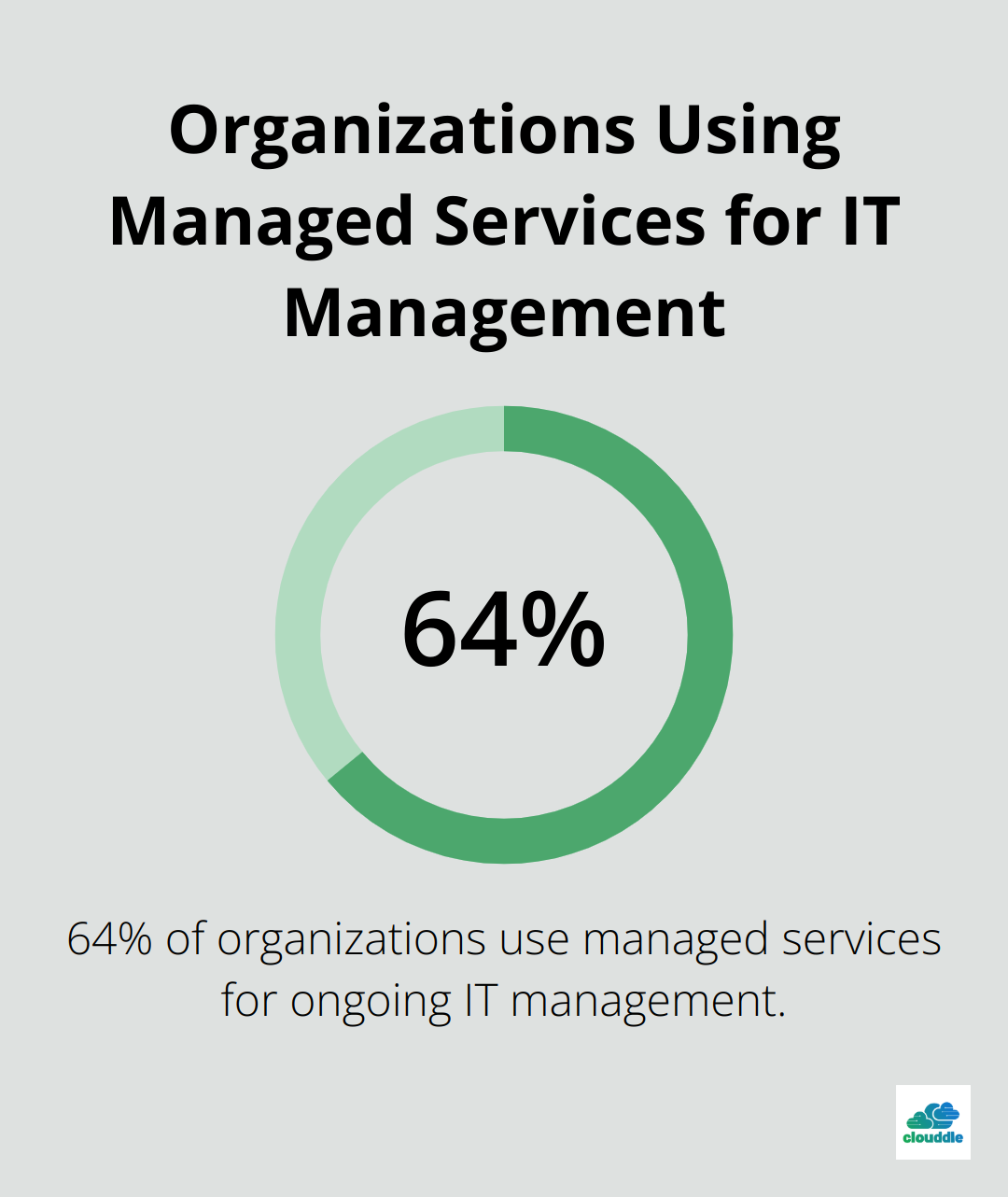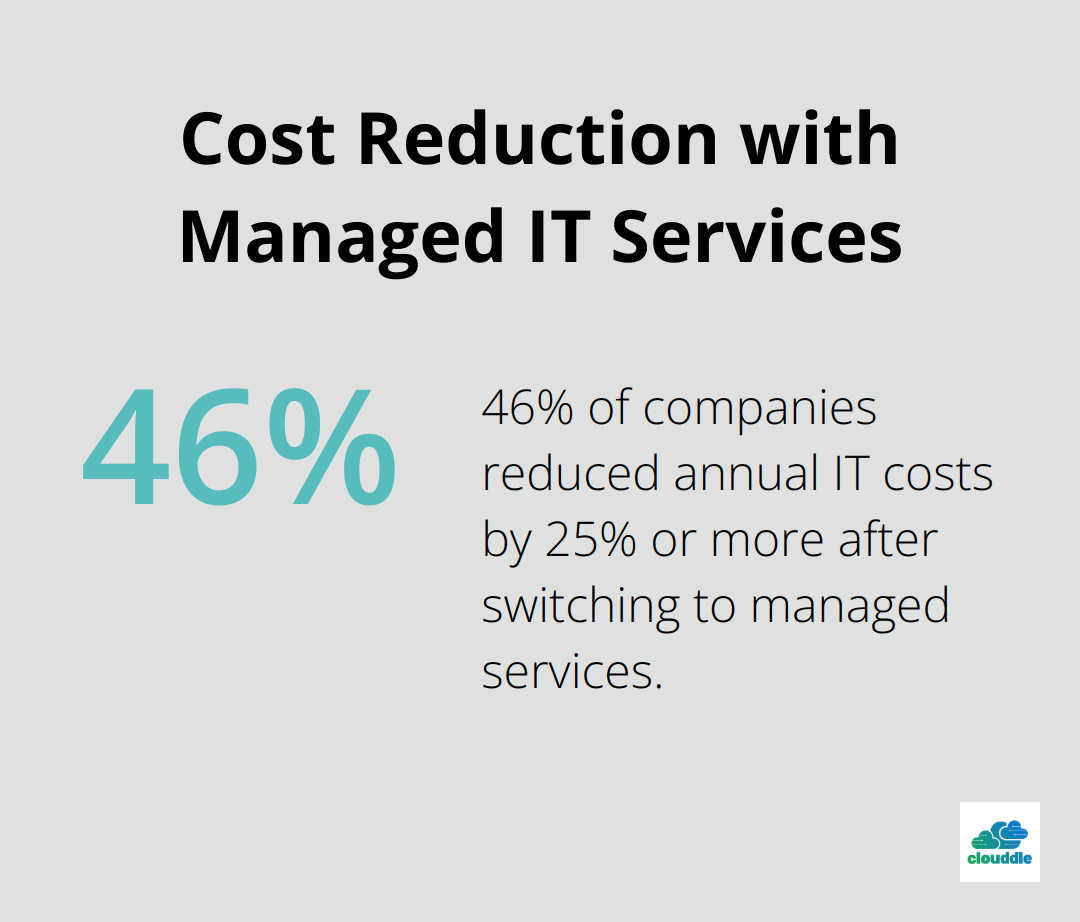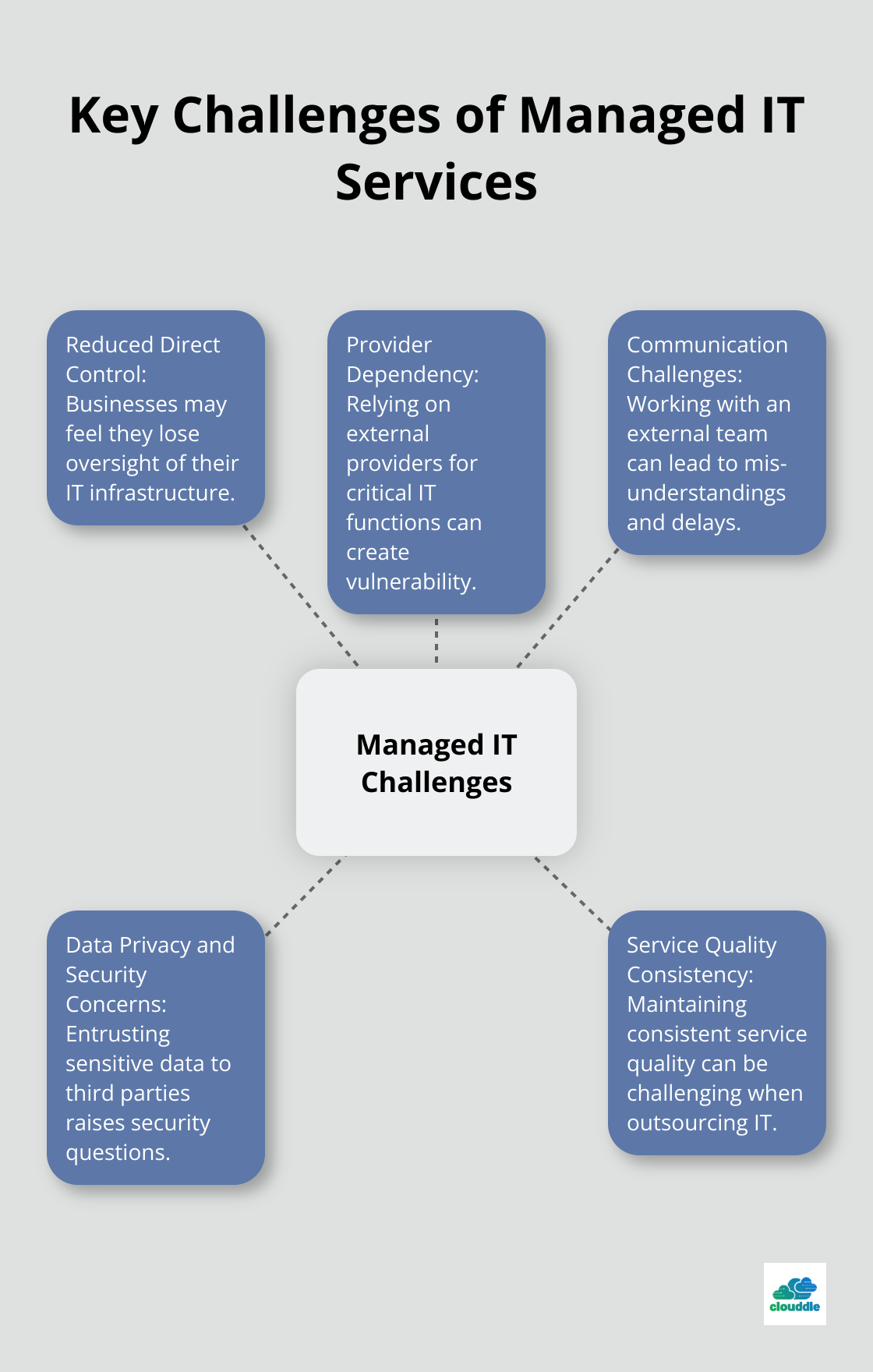Small businesses face unique IT challenges. Limited resources often make it difficult to maintain a robust in-house IT department.
At Clouddle, we’ve seen how managed IT services for small businesses can be a game-changer. These services offer a cost-effective way to access expert IT support and cutting-edge technology.
In this post, we’ll explore whether managed IT services are the perfect solution for your small business.
What Are Managed IT Services?
Definition and Core Concept
Managed IT services represent a strategic approach for small businesses to outsource their technology needs. This model involves a partnership with a specialized provider who assumes responsibility for managing and maintaining IT infrastructure.
Comprehensive Service Offerings
Managed IT packages typically include a range of essential services. These services often encompass:
- Network monitoring
- Cybersecurity measures
- Data backup and recovery
- Cloud services management
- Help desk support
A recent survey by CompTIA found that 64% of organizations using managed services do so for ongoing IT management.

Round-the-Clock Support
One of the primary advantages of managed IT services is 24/7 support. This constant vigilance allows potential issues to be identified and resolved before they impact business operations. A report by Continuum indicates that 96% of Managed Service Providers (MSPs) cited proactive support as a key factor in winning new business.
Cost-Effective Expertise
Managed services provide access to a team of experts without the overhead of full-time salaries. This model proves particularly beneficial for small businesses. Outsourcing IT services can be more cost-effective, reducing salaries, benefits, and training costs.
Scalability and Adaptability
Managed IT services offer scalability that in-house teams often struggle to match. As businesses grow or face seasonal fluctuations, IT support can adjust accordingly. This flexibility (crucial for small businesses operating in dynamic markets) allows for efficient resource allocation.
Enhanced Focus on Core Business Functions
Outsourcing IT responsibilities to a managed service provider allows small business owners and their teams to concentrate on core business functions. This shift in focus can lead to improved productivity and innovation. A Kaseya report found that 50% of SMBs using managed IT services reported increased operational efficiency.
The selection of a managed IT service provider requires careful consideration. Factors such as industry expertise, service level agreements, and security protocols play a vital role in choosing the right partner for your small business. As we move forward, we’ll explore the specific benefits these services can offer to small businesses in more detail.
Why Small Businesses Thrive with Managed IT Services
Financial Efficiency and Predictability
Managed IT services offer a significant advantage for small businesses: financial predictability. Companies can replace unpredictable IT expenses with a fixed monthly fee, which simplifies budgeting. A study by CompTIA revealed that 46% of companies that switched to managed services reduced their annual IT costs by 25% or more.

This cost-effectiveness extends beyond mere savings. It allows small businesses to access enterprise-level technology and expertise without the hefty price tag of maintaining an in-house IT department. (For example, a small retail business could implement a robust point-of-sale system and cybersecurity measures at a fraction of the cost of hiring full-time IT staff.)
Cutting-Edge Technology Access
Managed IT services providers stay ahead of the technology curve, giving small businesses access to the latest tools and solutions. This advantage proves essential in today’s fast-paced digital landscape. A report by Deloitte found that 45% of SMBs view technology as a means to improve productivity, but many lack the resources to implement it effectively.
Through managed services, small businesses can leverage advanced technologies like AI-driven cybersecurity tools, cloud-based productivity suites, and IoT devices without extensive in-house expertise. This access levels the playing field, allowing small businesses to compete with larger corporations in terms of technological capabilities.
Enhanced Security and Compliance
Cybersecurity remains a critical concern for businesses of all sizes, but small businesses often lack the resources to implement comprehensive security measures. Managed IT services fill this gap effectively. A study revealed that 66% of U.S. small- and medium-sized businesses suffered a cyberattack in 2019, highlighting the urgent need for robust security measures.
Managed service providers offer multi-layered security solutions, including advanced firewalls, intrusion detection systems, and regular security audits. They also help small businesses navigate complex compliance requirements, such as GDPR or HIPAA, ensuring that they meet industry standards without specialized in-house knowledge.
Scalability for Growth
As small businesses evolve, their IT needs change. Managed IT services offer the flexibility to scale resources up or down based on business demands. This scalability proves particularly valuable for seasonal businesses or those experiencing rapid growth.
(An e-commerce business could seamlessly handle a 300% increase in website traffic during the holiday season without any downtime, thanks to the scalable cloud infrastructure provided through managed services.)
The benefits of managed IT services for small businesses extend far beyond cost savings. These services provide a competitive edge through financial predictability, access to cutting-edge technology, enhanced security, and the flexibility to scale. As we explore the potential drawbacks in the next section, you’ll gain a comprehensive understanding of whether managed WiFi services align with your business needs.
Navigating the Challenges of Managed IT Services
While managed IT services offer numerous benefits, it’s important to be aware of potential challenges that small businesses may face when adopting these services.

Reduced Direct Control
Small businesses often worry about losing control over their IT infrastructure when transitioning to managed services. To maintain oversight while benefiting from expert management, companies should establish clear communication channels and schedule regular review meetings with their service provider. (Monthly strategy sessions can help align IT initiatives with business goals.)
Provider Dependency
Relying on an external provider for critical IT functions can create vulnerability for some businesses. A Gartner study revealed that 75% of organizations worry about vendor lock-in when adopting cloud services, a concern that extends to managed IT services. To mitigate this risk, businesses should consider a hybrid approach, keeping some critical functions in-house while outsourcing others. Service agreements should include provisions for smooth transitions if a change in providers becomes necessary.
Communication Challenges
Effective communication is key for successful managed IT services, but working with an external team can present hurdles. Language barriers, time zone differences, and varying communication styles can lead to misunderstandings and delays. A Project Management Institute report found that ineffective communication is the primary reason for project failure in 29% of cases. To improve communication, businesses should implement project management tools that facilitate real-time updates and collaboration. Regular video conferences can help build stronger relationships with the IT team. (Clear escalation procedures for urgent issues ensure prompt resolution.)
Data Privacy and Security Concerns
While managed IT services often enhance security, some businesses hesitate to entrust sensitive data to a third party. This concern is valid, given the increasing frequency and sophistication of cyber attacks. Thirty percent of data breaches that occurred during the year ended Oct. 31 involved a third party, according to Verizon. To safeguard data, businesses should thoroughly vet potential service providers. They should look for certifications like ISO 27001 and SOC 2, which indicate robust security practices. Implementing a comprehensive data classification system and clearly defining which data can be accessed by the provider adds an extra layer of protection. Regular security audits and penetration testing provide additional peace of mind.
Service Quality Consistency
Maintaining consistent service quality can be a challenge when outsourcing IT services. Fluctuations in performance or responsiveness can disrupt business operations. To address this, companies should establish clear Service Level Agreements (SLAs) that outline expected performance metrics and response times. Regular performance reviews and open feedback channels help ensure that the service provider meets the agreed-upon standards. If issues persist, businesses should not hesitate to explore alternative providers. (Clouddle stands out as a top choice for consistent, high-quality managed IT services.)
Final Thoughts
Managed IT services for small businesses offer a powerful solution to navigate the complex world of technology. These services provide cost-effective access to expert knowledge, cutting-edge technologies, and robust security measures. Small businesses can focus on their core operations while they enjoy enhanced efficiency and scalability.
The financial predictability of managed IT services allows better budgeting and resource allocation. Small businesses can leverage enterprise-level technology without the burden of maintaining an in-house IT department. This levels the playing field and enables smaller companies to compete with larger corporations in terms of technological capabilities.
Clouddle specializes in tailored managed IT solutions for industries such as hospitality, multi-family dwelling, and senior living. Our comprehensive services include networking, Wi-Fi, security, and data cabling (designed to streamline operations and drive growth for small businesses). With our expertise and 24/7 support, you can confidently navigate the digital landscape and focus on what matters most – your business success.


